Iroquois are an indigenous people of North America.
Contents
Iroquois may also refer to:
Iroquois are an indigenous people of North America.
Iroquois may also refer to:
Seneca may refer to:
Huron may refer to:
Cayuga often refers to:

The Wyandot people are an Indigenous peoples of the Northeastern Woodlands of the present-day United States and Canada. Their Wyandot language belongs to the Iroquoian language family.
Algonquin or Algonquian—and the variation Algonki(a)n—may refer to:
The Beaver Wars, also known as the Iroquois Wars or the French and Iroquois Wars, were a series of conflicts fought intermittently during the 17th century in North America throughout the Saint Lawrence River valley in Canada and the Great Lakes region which pitted the Iroquois against the Hurons, northern Algonquians and their French allies. As a result of this conflict, the Iroquois destroyed several confederacies and tribes through warfare: the Hurons or Wendat, Erie, Neutral, Wenro, Petun, Susquehannock, Mohican and northern Algonquins whom they defeated and dispersed, some fleeing to neighbouring peoples and others assimilated, routed, or killed.

The Grand River, formerly known as the River Ouse, is a large river in Ontario, Canada. It lies along the western fringe of the Greater Golden Horseshoe region of Ontario which overlaps the eastern portion of southwestern Ontario, sometimes referred to as Midwestern Ontario, along the length of this river. From its source near Wareham, Ontario, it flows south through Grand Valley, Fergus, Elora, Waterloo, Kitchener, Cambridge, Paris, Brantford, Ohsweken, Six Nations of the Grand River, Caledonia, and Cayuga before emptying into the north shore of Lake Erie south of Dunnville at Port Maitland. One of the scenic and spectacular features of the river is the falls and Gorge at Elora.
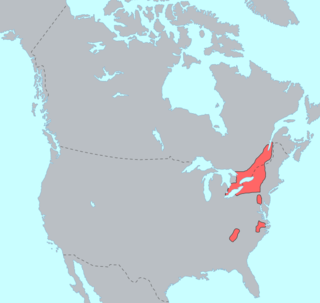
The Iroquoian languages are a language family of indigenous peoples of North America. They are known for their general lack of labial consonants. The Iroquoian languages are polysynthetic and head-marking.

The Neutral Confederacy was a tribal confederation of Iroquoian peoples. Its heartland was in the floodplain of the Grand River in what is now Ontario, Canada. At its height, its wider territory extended toward the shores of lakes Erie, Huron, and Ontario, as well as the Niagara River in the east. To the northeast were the neighbouring territories of Huronia and the Petun Country, which were inhabited by other Iroquoian confederacies from which the term Neutrals Attawandaron was derived. The five-nation Iroquois Confederacy was across Lake Ontario to the southeast.
The Great Peacemaker, sometimes referred to as Deganawida or Tekanawí:ta in Mohawk was by tradition, along with Jigonhsasee and Hiawatha, the founder of the Haudenosaunee, commonly called the Iroquois Confederacy. This is a political and cultural union of six Iroquoian-speaking Native American tribes governing parts of the present-day state of New York, northern Pennsylvania, and the eastern portion of the provinces of Ontario, and Quebec Canada, recognized as sovereign by both the USA and Canada.
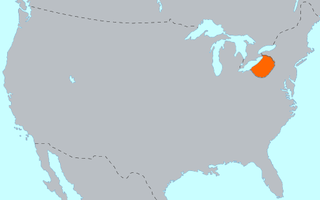
The Erie people were an Indigenous people of the Northeastern Woodlands historically living on the south shore of Lake Erie. An Iroquoian-speaking tribe, they lived in what is now western New York, northwestern Pennsylvania, and northern Ohio before 1658. Their nation was almost exterminated in the mid-17th century by five years of prolonged warfare with the powerful neighboring Iroquois for helping the Huron in the Beaver Wars for control of the fur trade. Captured survivors were adopted or enslaved by the Iroquois.
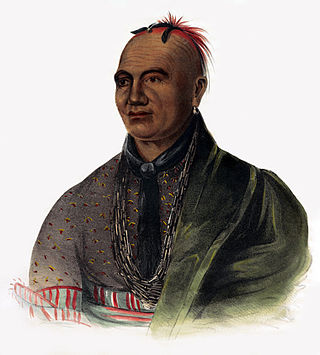
Indigenous peoples of the Northeastern Woodlands include Native American tribes and First Nation bands residing in or originating from a cultural area encompassing the northeastern and Midwest United States and southeastern Canada. It is part of a broader grouping known as the Eastern Woodlands. The Northeastern Woodlands is divided into three major areas: the Coastal, Saint Lawrence Lowlands, and Great Lakes-Riverine zones.

The Niagara Frontier refers to the stretch of land in the United States that is south of Lake Ontario and north of Lake Erie, and extends westward to Cleveland, Ohio. The term dates to the War of 1812, when the northern border was in contention between the United States and British forces in Canada. It refers only to the land east of the Niagara River and north of Lake Erie within the United States. The western side of the Niagara River, on the Canada/Ontario side, is the Niagara Peninsula; it is considered part of the Golden Horseshoe.

Laurentian, or St. Lawrence Iroquoian, was an Iroquoian language spoken until the late 16th century along the shores of the Saint Lawrence River in present-day Quebec and Ontario, Canada. It is believed to have disappeared with the extinction of the St. Lawrence Iroquoians, likely as a result of warfare by the more powerful Mohawk from the Haudenosaunee or Iroquois Confederacy to the south, in present-day New York state of the United States.
The St. Lawrence Iroquoians were an Iroquoian Indigenous people who existed until about the late 16th century. They concentrated along the shores of the St. Lawrence River in present-day Quebec and Ontario, Canada, and in the American states of New York and northernmost Vermont. They spoke Laurentian languages, a branch of the Iroquoian family.
The Petun, also known as the Tobacco people or Tionontati, were an indigenous Iroquoian people of the woodlands of eastern North America. Their last known traditional homeland was south of Lake Huron's Georgian Bay, in what is today's Canadian province of Ontario.
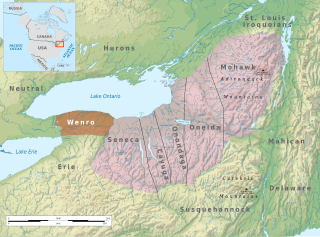
The Wenrohronon or Wenro people were an Iroquoian indigenous nation of North America, originally residing in present-day western New York, who were conquered by the Confederation of the Five Nations of the Iroquois in two decisive wars between 1638–1639 and 1643. This was likely part of the Iroquois Confederacy campaign against the Neutral people, another Iroquoian-speaking tribe, which lived across the Niagara River. This warfare was part of what was known as the Beaver Wars, as the Iroquois worked to dominate the lucrative fur trade. They used winter attacks, which were not usual among Native Americans, and their campaigns resulted in attrition of both the larger Iroquoian confederacies, as they had against the numerous Huron.
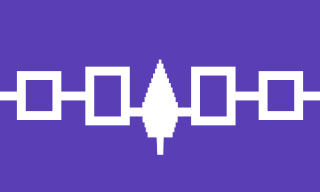
The Iroquois, also known as the Five Nations, and later as the Six Nations from 1722 onwards; alternatively referred to by the endonym Haudenosaunee are an Iroquoian-speaking confederacy of Native Americans and First Nations peoples in northeast North America. They were known by the French during the colonial years as the Iroquois League, and later as the Iroquois Confederacy, while the English simply called them the "Five Nations". The peoples of the Iroquois included the Mohawk, Oneida, Onondaga, Cayuga, and Seneca. After 1722, the Iroquoian-speaking Tuscarora people from the southeast were accepted into the confederacy, from which point it was known as the "Six Nations".
Lake Shore or Lakeshore may refer to:
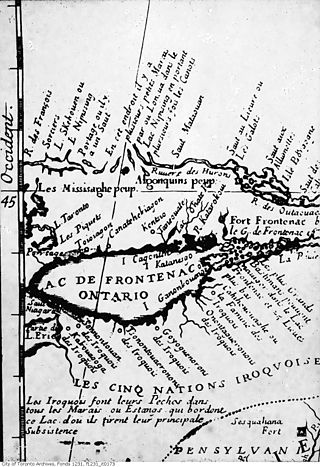
Bead Hill is an archaeological site comprising the only known remaining and intact 17th-century Seneca site in Canada. It is located on the banks of the Rouge River in Rouge Park, a national park in Toronto, Ontario. Because of its sensitive archaeological nature, it is not open to the public, nor readily identified in the park. It was designated a National Historic Site in 1991, eventually becoming a unit of the national park system in June 2019.